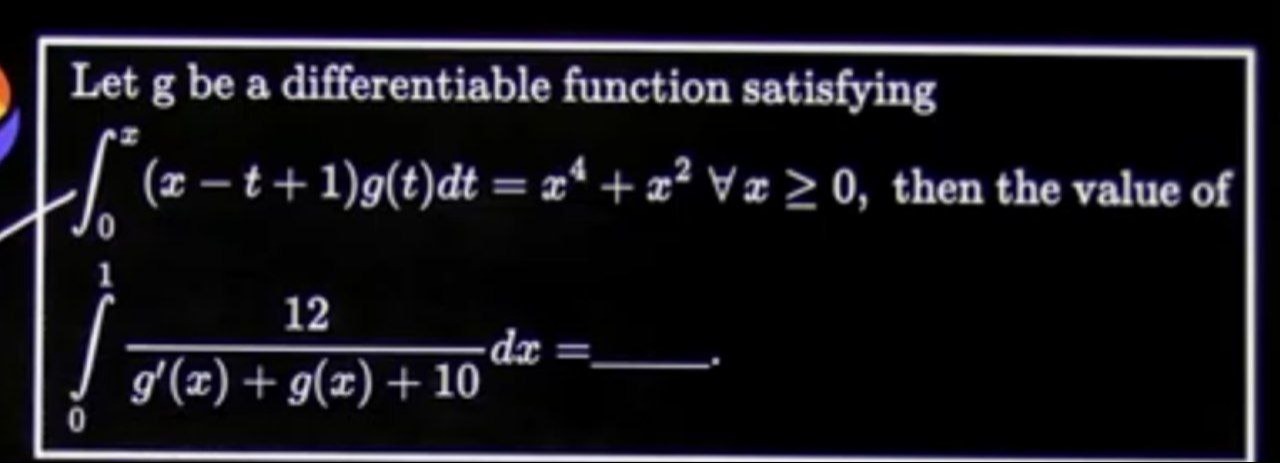Question
Question: Let g be a differentiable function satisfying $\int_{0}^{x}(x-t+1)g(t)dt=x^4+x^2 \forall x \geq 0$,...
Let g be a differentiable function satisfying
∫0x(x−t+1)g(t)dt=x4+x2∀x≥0, then the value of
∫01g′(x)+g(x)+1012dx=____.

4π
Solution
The given integral equation is:
∫0x(x−t+1)g(t)dt=x4+x2∀x≥0
We can split the integral on the left-hand side:
∫0x(x+1)g(t)dt−∫0xtg(t)dt=x4+x2
Since (x+1) is independent of t, we can take it out of the first integral:
(x+1)∫0xg(t)dt−∫0xtg(t)dt=x4+x2(∗)
Now, we differentiate both sides with respect to x. We use the Leibniz integral rule, which states that if F(x)=∫a(x)b(x)f(x,t)dt, then F′(x)=f(x,b(x))b′(x)−f(x,a(x))a′(x)+∫a(x)b(x)∂x∂f(x,t)dt.
For the first term, (x+1)∫0xg(t)dt:
Using the product rule and the Fundamental Theorem of Calculus (dxd∫0xg(t)dt=g(x)):
dxd[(x+1)∫0xg(t)dt]=1⋅∫0xg(t)dt+(x+1)⋅g(x)
=∫0xg(t)dt+xg(x)+g(x)
For the second term, ∫0xtg(t)dt:
Using the Fundamental Theorem of Calculus:
dxd[∫0xtg(t)dt]=xg(x)
Differentiating the right-hand side, x4+x2:
dxd(x4+x2)=4x3+2x
Now, substitute these differentiated terms back into the differentiated equation (∗):
(∫0xg(t)dt+xg(x)+g(x))−xg(x)=4x3+2x
∫0xg(t)dt+g(x)=4x3+2x(1)
We need to find g′(x)+g(x), so we differentiate equation (1) with respect to x again.
Differentiating ∫0xg(t)dt gives g(x) (by Fundamental Theorem of Calculus).
Differentiating g(x) gives g′(x).
Differentiating 4x3+2x gives 12x2+2.
So, differentiating equation (1) yields:
g(x)+g′(x)=12x2+2
Now we need to evaluate the integral ∫01g′(x)+g(x)+1012dx.
Substitute the expression for g′(x)+g(x):
∫01(12x2+2)+1012dx
=∫0112x2+1212dx
Factor out 12 from the denominator:
=∫0112(x2+1)12dx
=∫01x2+11dx
This is a standard integral, ∫x2+a21dx=a1arctan(ax). Here a=1.
=[arctan(x)]01
=arctan(1)−arctan(0)
=4π−0
=4π
